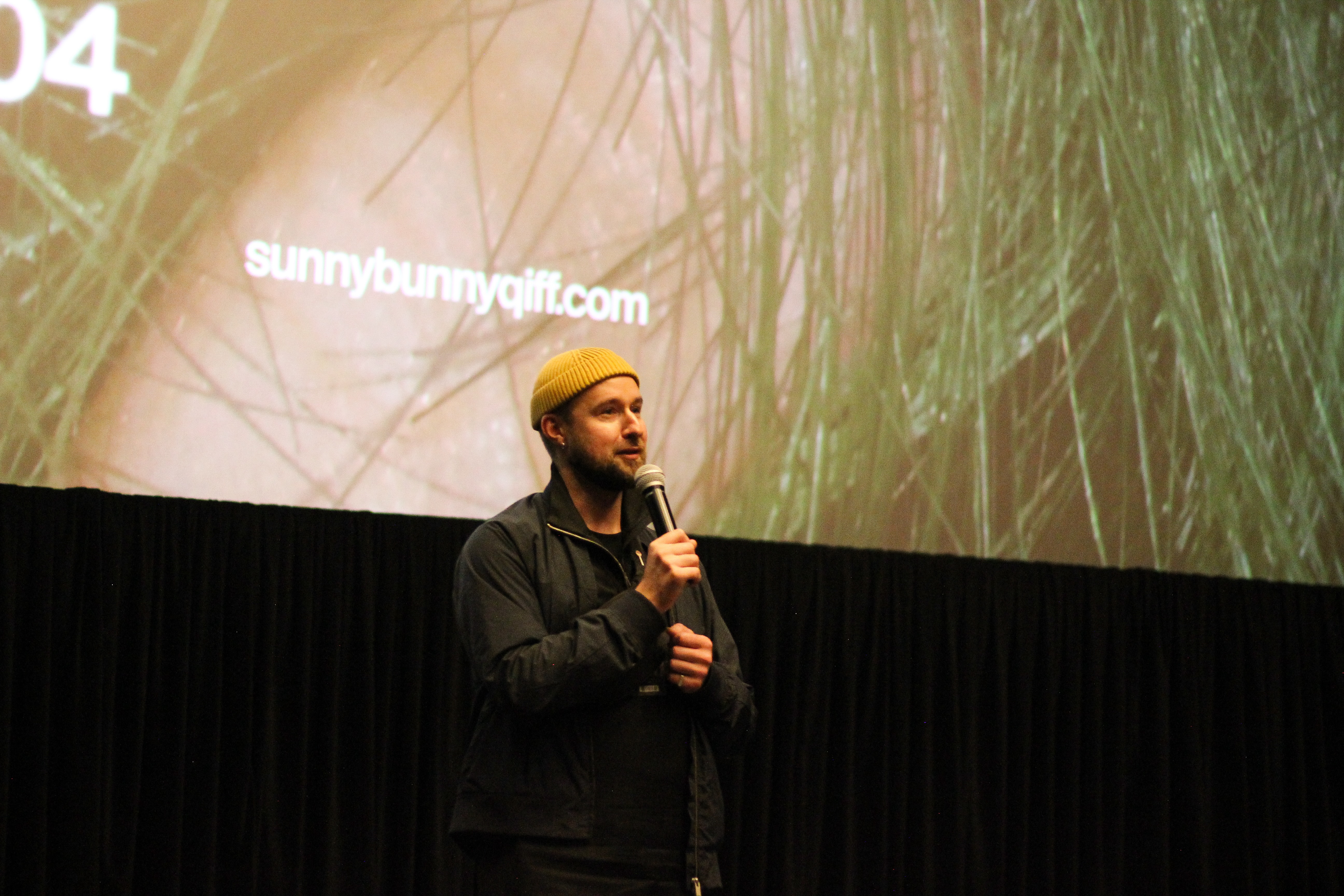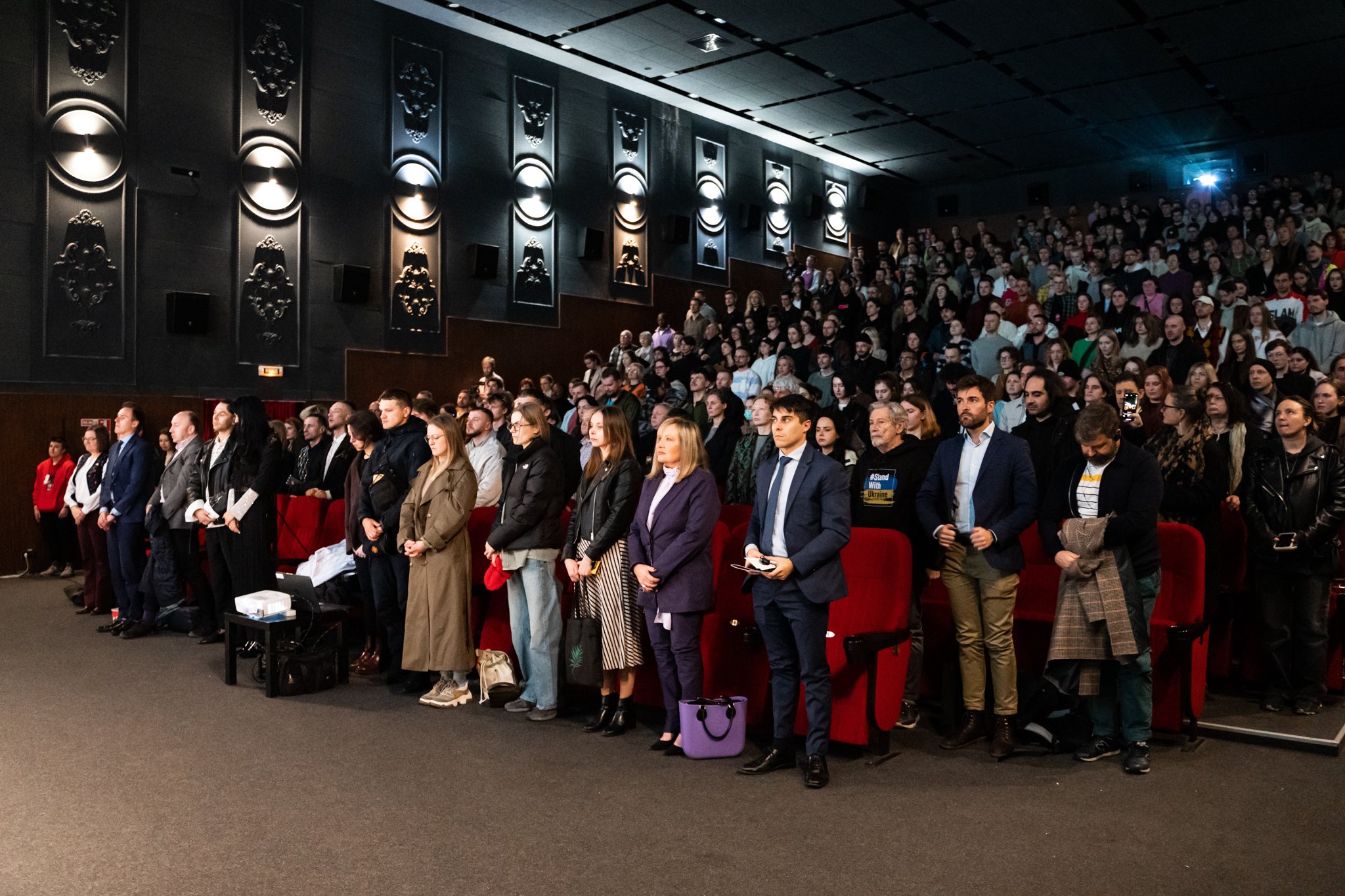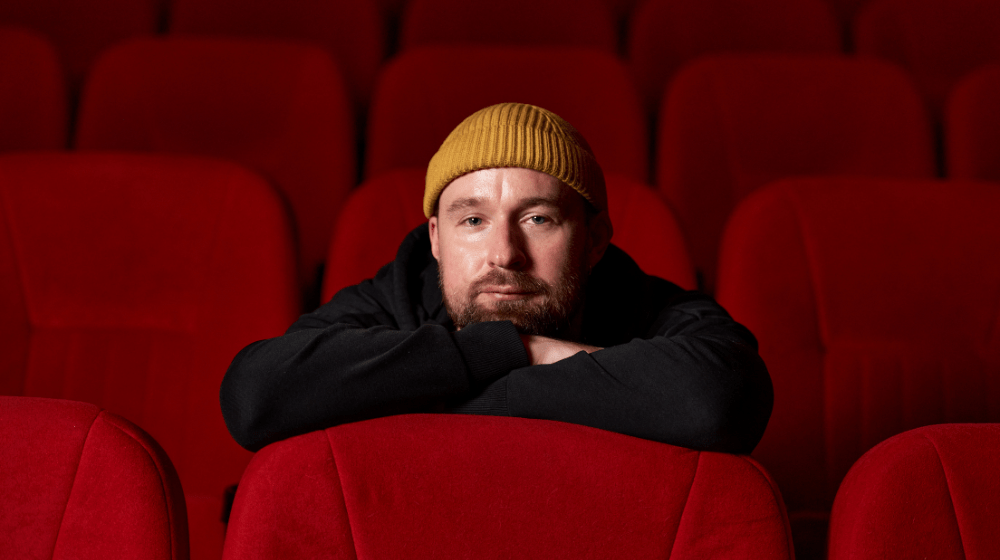KYIV, Ukraine – In Ukrainian, there is a colloquial term to describe the light that is reflected from a mirror on to the wall and moved around. It is called a “sunny bunny.”
So when it came to choosing a name for Ukraine’s first LGBTQIA+ film festival, the term felt like a fitting description for the artists holding up a mirror to their community and creating moving reflections of their stories through light and darkness. The inaugural Sunny Bunny Queer International Film Festival opened in Kyiv in 2023.
Sunny Bunny’s director and main curator is Bohdan Zhuk. The 35-year-old said the idea for the event had been brewing for years. LGBTQIA+ films had already been included in Kyiv’s longstanding film festival, known as Molodist, since 2001. “It was the most popular programme every year in terms of attendance at the festival, and it made sense to expand it,” he said.
But plans to create a stand-alone showcase were delayed first by the pandemic. Then, in 2022, Russia launched a full-scale invasion of Ukraine and put everything in doubt: “To be honest, we didn’t know what was going to happen next, whether we will be able to do anything.” As the initial wave of shock and fear subsided, though, the Sunny Bunny organizers saw that a queer film festival was not only possible but necessary: “The more ideological aspect was that, now is the right time because … it's the right time to be talking about human rights. It's the right time to be stressing the need for equal rights for our children and equality in general. And we felt like Sunny Bunny can bring more visibility to the community and to the issues that queer Ukrainians in particular are facing these days.”
Visibility for queer experiences
In choosing which films to include, Mr. Zhuk wanted to ensure Sunny Bunny provided a platform for a diverse range of voices representing different gender identities, backgrounds and experiences. The first year featured more than 60 short and feature-length films and documentaries. Many shined a light on the challenges of queer life, like homophobia, transphobia, discrimination and gender-based violence. Others, like the festival’s closing film, were celebrations of queer joy, resistance and solidarity. “As any queer film festival, it's absolutely essential and its main function and aim is to give visibility to the community and to give the community a chance to see themselves on screen,” Mr. Zhuk explained. “Hopefully it gives more LGBTQ+ people some confidence and some better understanding of themselves, of the community and of their needs.”

UNFPA supports efforts to engage the LGBTQIA+ community and address their unique needs and concerns, especially in cases of gender-based violence. "We need to ensure that LGBTQIA+ survivors are not only acknowledged in our communication campaigns but also supported through strong partnerships with local LGBTQIA+ organizations," said Massimo Dianna, UNFPA Representative in Ukraine. "Initiatives like the Sunny Bunny Queer International Film Festival play a vital role in fostering acceptance and visibility for LGBTQIA+ people, creating platforms for their voices to be heard and their stories to be seen, especially during times of war.” UNFPA recognizes the critical need to tailor specialized gender-based violence services to overcome the challenges that discourage LGBTQIA+ individuals from seeking help, such as the fear of being outed by service providers. By working collaboratively and addressing these barriers, UNFPA hopes to encourage a safer environment where all survivors feel empowered to seek the support they need.
Ukrainian storytelling
While Sunny Bunny is an international film competition, it also reserves space in its schedule for Ukrainian-specific stories. In 2023, Mr. Zhuk curated a retrospective on Ukrainian queer cinema as a response to LGBTQIA+ opponents “who are eager to say and always repeat that this is something that comes from the West and that there's no queerness or no homosexuality in Ukraine. And of course that's ridiculous, so it felt essential to be doing this and to show that it's not just some films from the last few years, but it has history.”
Since the start of the full-scale invasion, the Ukrainian public’s attitudes toward the LGBTQIA+ community have been shifting. A survey by the rights group Nash Svit found that the number of people who had a negative view of the LGBTQIA+ community had dropped from around 60 per cent in 2016 to 34 per cent in 2023.
“The fight for LGBT rights is part of the bigger fight for our freedom, for our right to exist, which is what this war is about,” said Mr. Zhuk. “The attitude to life has changed since the full-scale invasion among most Ukrainians, in particular about equality. Queer people are side by side with all the others, and there's a lot more understanding of that.”
A statement by UNFPA Executive Director Dr. Natalia Kanem on this year’s International Day Against Homophobia, Transphobia and Biphobia also underscored promoting equal rights, even in war zones. “During conflicts and crises, [LGBTQIA+ people’s] rights may be overlooked and their unique needs for protection and health care can go unmet,” she said. “To truly leave no one behind means safeguarding the rights of LGBTQIA+ people in all settings and including them fully in humanitarian preparedness, response, relief and recovery efforts.”
Art as a form of activism
While Sunny Bunny has received some insults and threats online, Mr. Zhuk said the response has been overwhelmingly positive – and slightly surprised. “I hear from some people who are, let's say over 40, who say they couldn't believe even some years ago that there would be a queer film festival,” he said. “And that in the main cinema in Kyiv where all the festivals and all the main events and premieres happen, a queer film festival is happening. And there's so much expression of queerness and of different identities, there's so much freedom.”

Mr. Zhuk has more plans to increase Sunny Bunny’s impact. For example, funding for the arts has been significantly scaled back during the war, so the festival is creating prizes to fund the production of more queer films that can bring more representation and visibility to wider audiences.
“I feel like there is a lot of potential with this work with the Sunny Bunny Festival in particular, but also more in general, how the artistic means and cultural means can push further and can promote very well these ideas of equal rights, of solving different problems and issues for this community and for other marginalized or affected groups,” he said. “I believe the festival can help to support the community, to unite the community and to be one of the channels to change the bigger society.”


